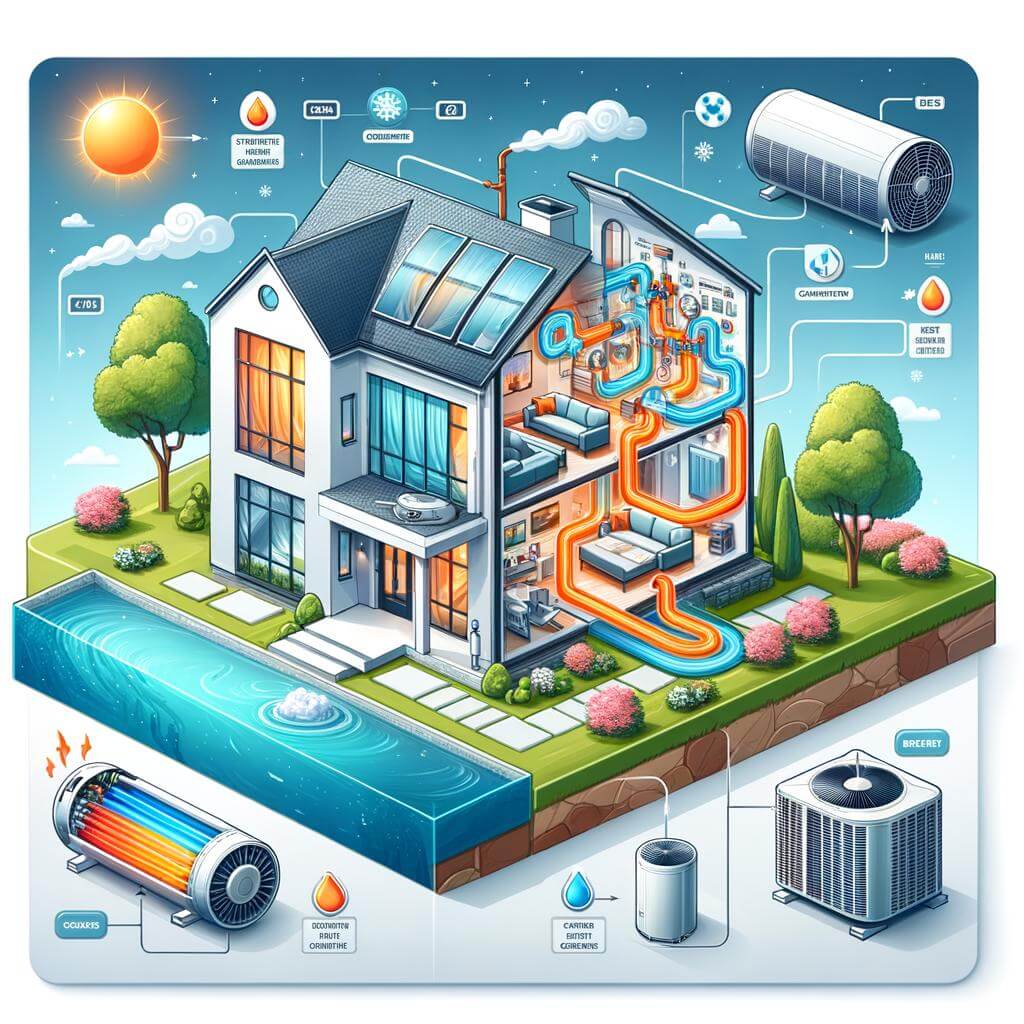Welcome to our informative post titled “Examining Heat Pumps: A Superior AC/Heating Solution”. This post aims to educate you about the benefits and efficiency of using heat pumps as an alternative to traditional AC and heating systems. Our expert analysis and fact-based information will guide you in understanding how heat pumps work, their advantages, and how they can present a superior solution for maintaining a comfortable indoor environment. Whether you’re a homeowner seeking energy-efficient heating or cooling solutions, or just someone interested in learning about the science of heat pump, this post will be your comprehensive guide. By the end of this read, you will be equipped with valuable knowledge that can help you make an informed decision for your home heating and cooling needs. So, dive in and let’s explore the world of heat pumps together!
Understanding Heat Pumps: The Future of Home Comfort
Heat pumps have revolutionized home comfort solutions with their unparalleled flexibility and high energy efficiency. Not only do they serve as an exquisite cooling unit in the summer, but they can also transform into a remarkable heating unit during the chilly winter months. This dual functionality sets them apart from most other air conditioning and heating systems and puts them at the leading edge of home comfort equipment.
One of the cardinal elements that outline the superiority of heat pumps is the way they transfer heat rather than generating it. Since these units simply move preexisting heat, they consume up to 50% less energy than traditional systems that generate heat. Let’s understand some more benefits of heat pumps:
- Flexibility: Heat pumps offer both heating and cooling functions in a single unit, saving you from the hassle of purchasing and maintaining separate units.
- Efficiency: The advanced technology in heat pumps allow them to produce two to four times as much heat or cooling per unit of electricity, as compared to traditional heating/cooling systems.
- Eco-friendly: Heat pumps leverage ambient temperature for heat transfer, reducing the emission of greenhouse gases.
- Longevity: Lasting typically between 10-15 years, heat pumps outlast most traditional HVAC systems.
In the table below, we have compared the typical lifespan, efficiency, and operating costs of a heat pump system, with that of a traditional AC unit:
| System | Typical Lifespan | Efficiency | Operating Cost |
|---|---|---|---|
| Heat Pump | 10-15 years | High | Low |
| Traditional AC | 10-12 years | Low-Medium | High |
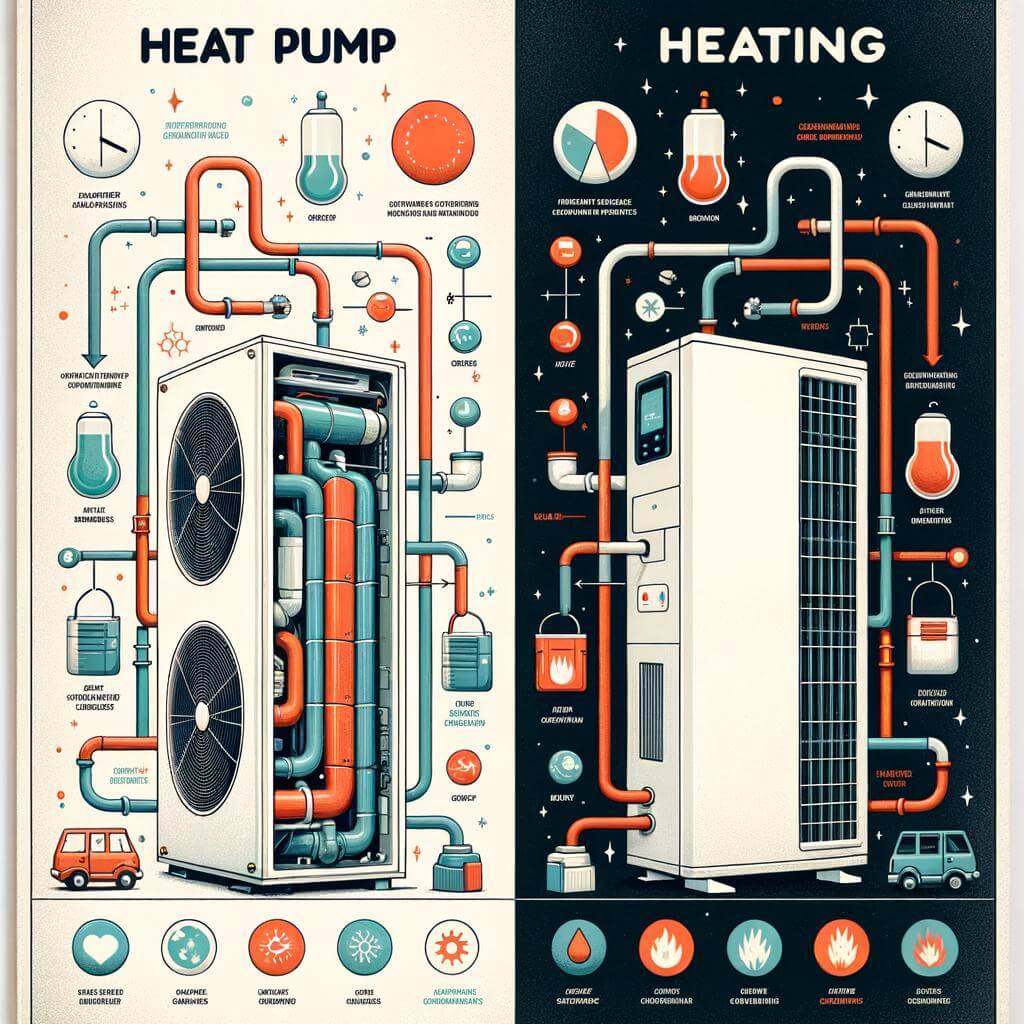
The Advantages of Heat Pumps over Traditional AC/Heating Systems
When looking at long-term benefits, heat pumps come out on top over traditional air conditioning and heating systems. These systems use the principle of heat transfer, where heat is moved from one place to another, instead of burning fuel to create it. Here are some notable advantages that make heat pumps a superior choice:
- Energy Efficiency: Heat pumps are incredibly efficient as they simply transfer heat, instead of generating it. This process requires significantly less energy, leading to lower energy bills.
- Lower Operating Costs: With reduced energy consumption, the overall operating costs for heat pumps are much lower than traditional AC/heating systems.
- Environmentally Friendly: Since heat pumps use heat transfer rather than burning fossil fuels, they release far fewer carbon emissions.
- Year-Round Comfort: Unlike traditional systems, heat pumps offer both heating and cooling options in one unit, ensuring comfort all year round.
Below is a table that summarizes the comparison between heat pumps and traditional AC/heating systems. It illustrates the salient points that make heat pumps the superior choice for the environmentally conscious homeowner.
| Parameters | Heat Pumps | Traditional AC/Heating Systems |
|---|---|---|
| Energy Efficiency | High | Low |
| Operating Costs | Low | High |
| Environment Impact | Less | More |
| Dual Functionality | Yes | No |
Importantly, the benefits of heat pumps go further beyond energy efficiency and lower operating costs. Their versatility, dual functionality and less environmental impact are crucial considerations in today’s world where a shift towards sustainable solutions is much encouraged.
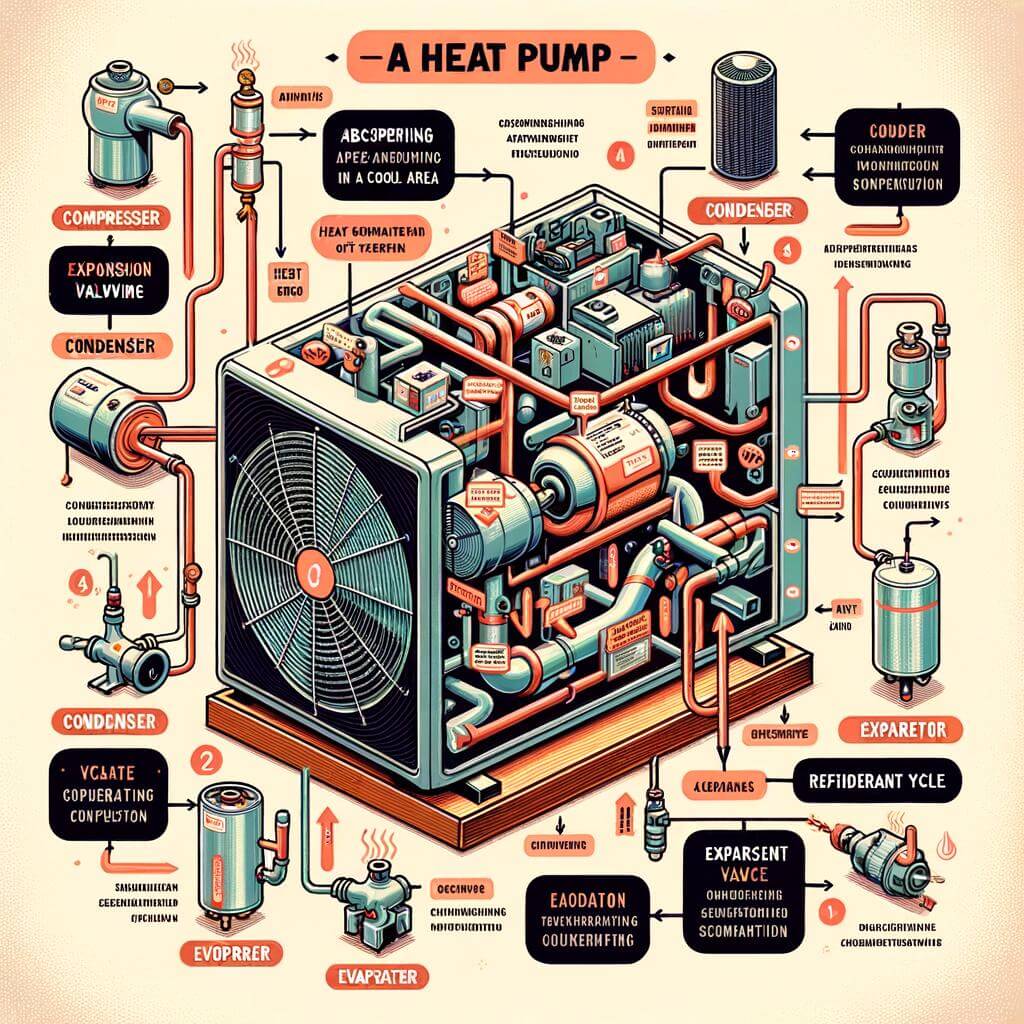
How Heat Pumps Work: An In-depth Analysis
Heat pumps are more than just an innovative solution, they can be seen as a hot topic in the sphere of heating, ventilation, and air conditioning (HVAC) systems. Heat pumps accomplish heating and cooling through a unique process of transferring heat rather than burning fuel. This means they can both cool a home, similar to an air conditioner, and heat it like a furnace.
Essentially, a Heat Pump operates on the basis of repeatedly moving heat from one place to another. During summer months, it extracts heat from inside your home and releases it outdoors, thereby providing cooling. Conversely, throughout the winter period, it extracts heat from the outdoor environment (even when it is cold) and transfers it indoors. This fantastic role-reversal attribute is what sets heat pumps apart from other HVAC appliances and makes them an efficient and versatile choice.
A Simple Table Illustrating a Heat Pump’s Mode of Operation:
SeasonHeat SourceHeat Destination
| Summer | Internal Environment | External Environment |
| Winter | External Environment | Internal Environment |
It is important to note that the efficiency of heat pumps varies depending on the outside temperature. Despite this, they still offer considerable energy savings compared to traditional cooling and heating systems. This is because they move heat rather than generate it. So, for homeowners seeking a sustainable, cost-effective, and energy-efficient heating and cooling solution, heat pumps might just be the answer!
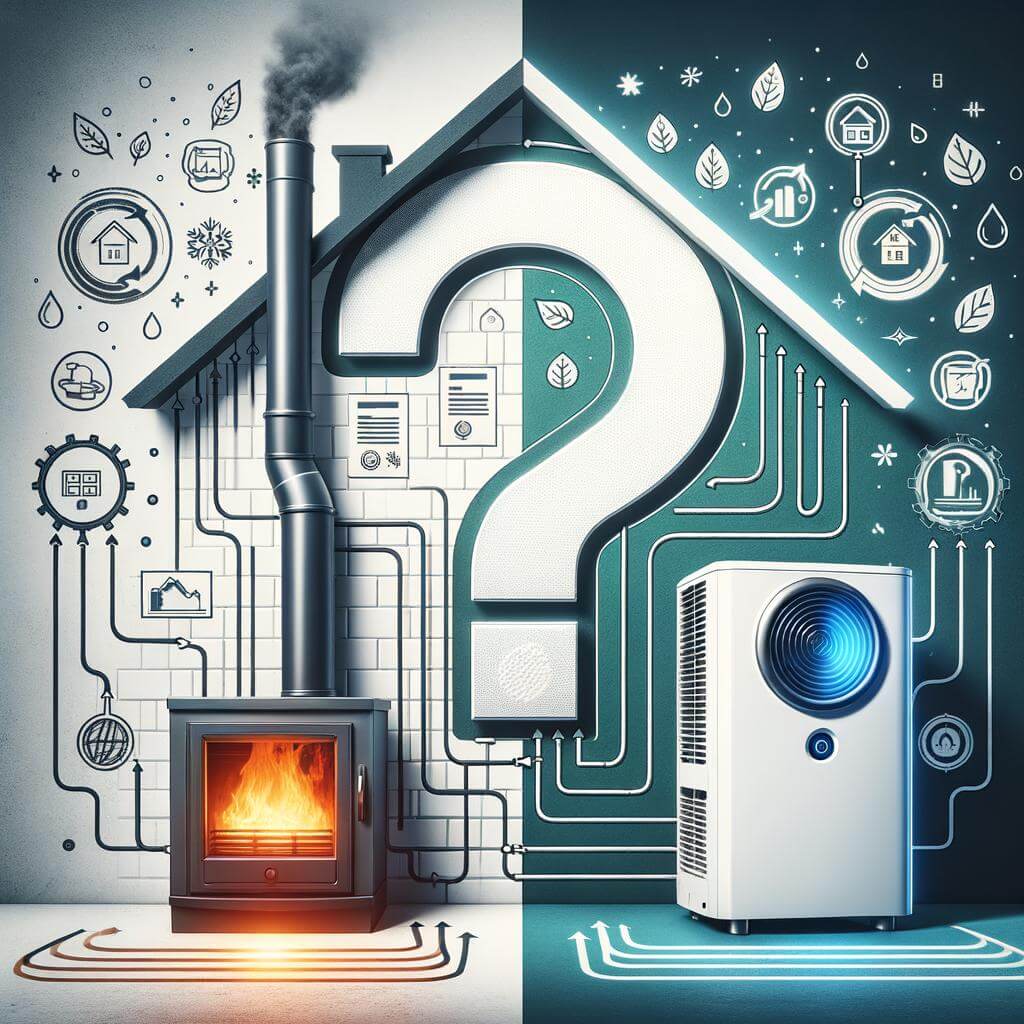
Making the Switch: Is a Heat Pump the Right Choice for Your Home
With the soaring cost of energy, many homeowners contemplate about making a significant transition to a more energy-efficient system. One such system that demands consideration is the heat pump. Recognized for dual functionality – heating as well as cooling – heat pumps are an efficient alternative to traditional HVAC systems, potentially cutting energy consumption by an impressive fifty percent. A common myth about heat pumps is that they’re only suitable for moderate climates. With the recent technology advancements, heat pumps have evolved to function efficiently even in the coldest conditions. So, whether you live in a sunny state or cold region, a heat pump could be an ideal solution.
- They’re energy-efficient: Heat pumps work by moving heat from one place to another instead of generating it, which makes them extremely energy-efficient.
- Reduced carbon emissions: By utilizing less energy, heat pumps indirectly contribute to reduced carbon emissions.
- Cooling in summer: In hot weather, heat pumps can reverse their operation to cool your home efficiently.
- Long lifespan: With proper maintenance, heat pumps can last up to 15 years, making them a cost-effective long-term investment.
| Type of Heat Pumps | Advantages |
|---|---|
| Air-Source Heat Pumps | Most common and affordable type, extracts heat from the air. |
| Ground-Source Heat Pumps | Utilizes heat from the ground, more efficient but expensive. |
| Absorption Heat Pumps | Operates on natural gas, suitable for larger homes. |
However, always remember, while the benefits are significant, a heat pump might not be the right choice for everyone. It’s always advised to assess your specific situation, requirements and budget before making the switch. After all, the key lies in finding a heating and cooling solution that offers the ideal balance of efficiency and affordability for your home.
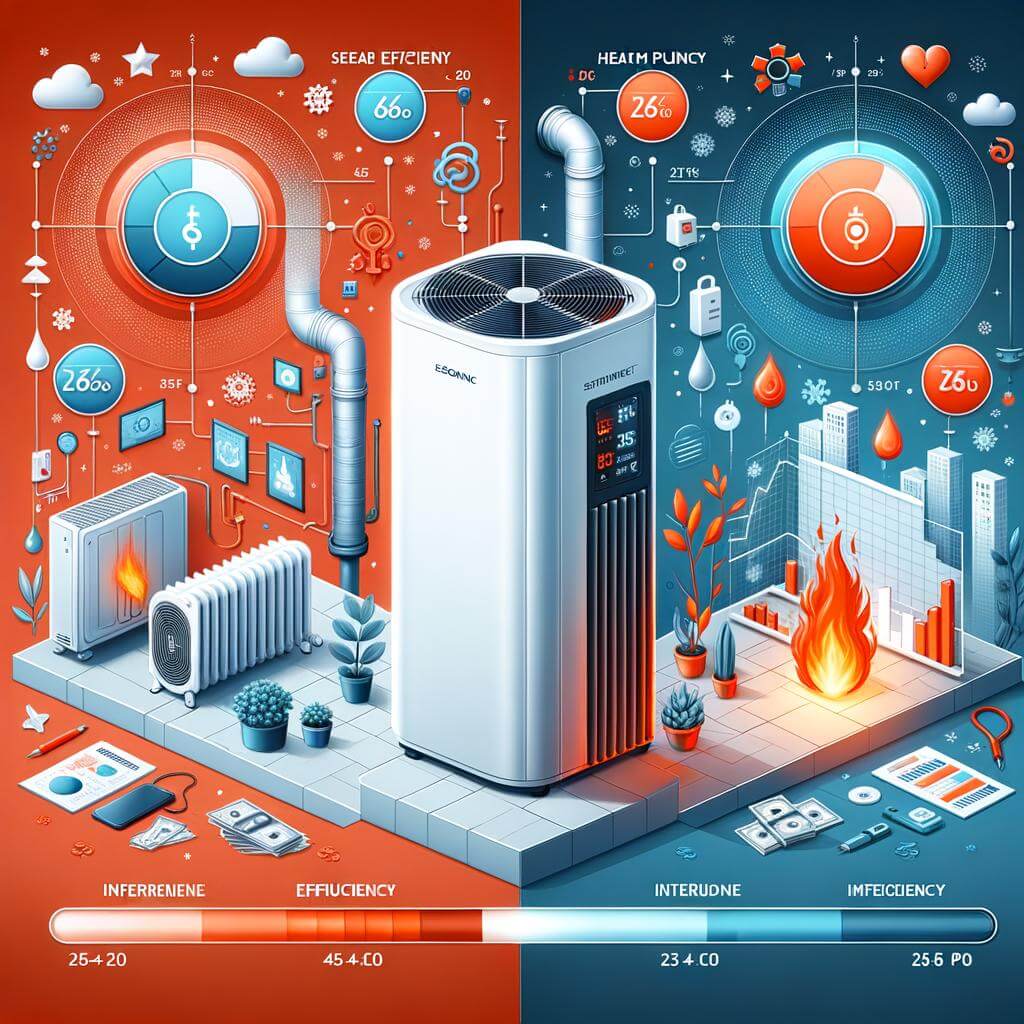
Saving Energy and Money: Efficiency Comparison of Heat Pumps and Standard Systems
The world moves towards sustainability, and choosing the right AC/Heating system for your home or workplace is definitely a part of it. But how do you know which one is right for you? In this section, we’re going to look at two popular options – heat pumps and standard systems, focusing specifically on their energy efficiency and cost-effectiveness. A heat pump operates on an impressively simple principle – it effectively transfers heat from one space to another. For instance, during chilly winters, the system extracts heat from outdoors and pumps it inside your space, providing you with a cosy environment. Contrarily, in sweltering summers, it works the other way round by collecting heat from indoors and releasing it outside. Now you may wonder, how efficient is this system?
- Power consumption: Heat pump units are highly efficient when it comes to power usage, consuming less power compared to traditional heating systems.
- Performance: The unorthodox mechanism of heat transfer (as opposed to generating heat) ensures a noticeable reduction in energy bills.
- Environmental impact: With significantly less carbon emissions, heat pumps have a lesser environmental footprint.
| Energy Source | Heat Pump | Standard System |
| Electricity | 300% – 400% | 100% |
| Natural Gas | 90% – 97% | 78% - 96% |
| Propane | 90% – 97% | 90% – 96% |
This efficiency comparison table illustrates the efficiency level of heat pumps and standard systems based on the energy source. Values are expressed in percentages indicating the amount of usable heat generated for every unit of energy consumed. While heat pumps are characteristically more energy-efficient, standard systems also have their merits. In areas with mild temperatures, they can be just as efficient. However, in regions prone to extreme weather conditions, a heat pump could be a real money saver. As with any significant decision, understanding your specific needs and circumstances is key.
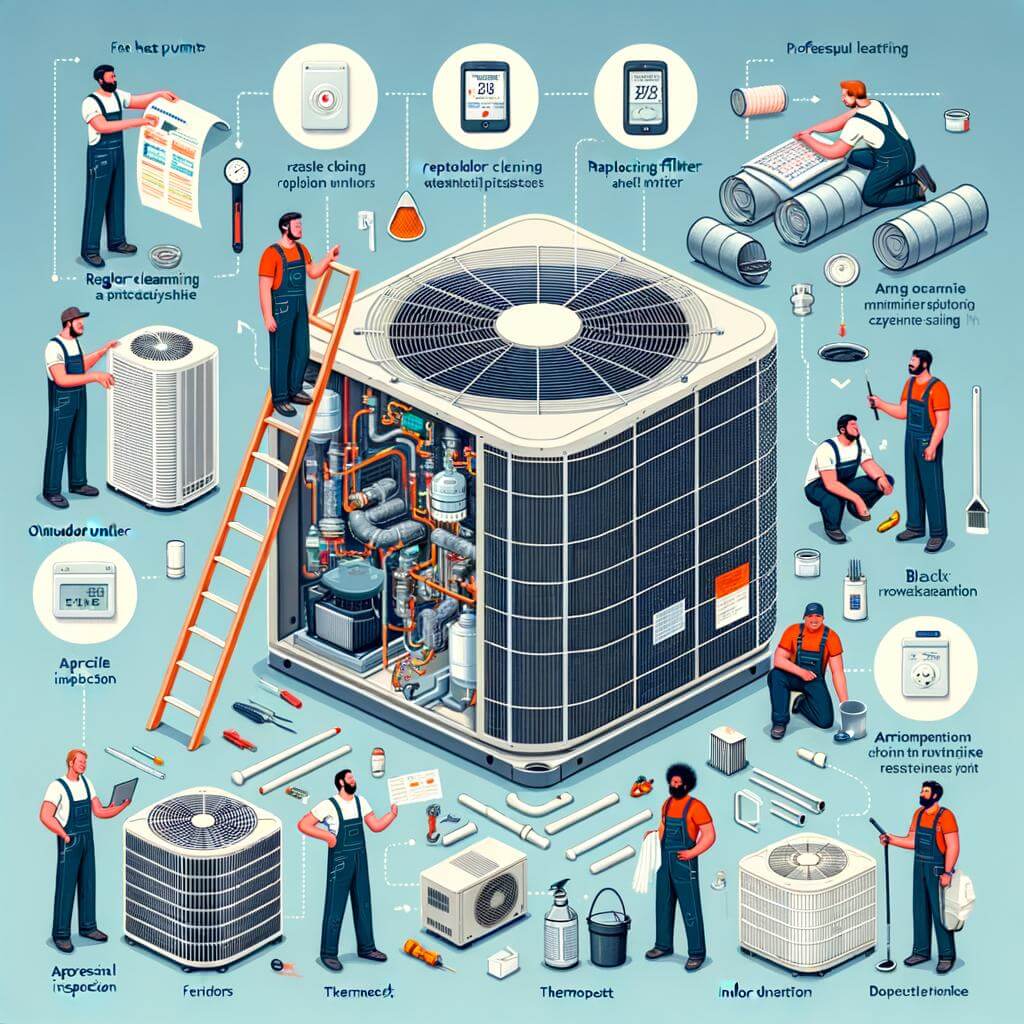
Expert Tips for Maintaining and Optimizing Your Heat Pump Performance
Heat pumps are an effective way of heating or cooling your home, but like any appliance, they need attention to perform optimally. Maintenance and optimization can improve the longevity and effectiveness of your heat pump, reducing energy bills and increasing home comfort. Here are some expert tips to keep your heat pump in peak condition.
Regular Inspection and Cleaning: Dust and dirt can hinder the performance of your heat pump, causing it to use more energy and run less efficiently. Inspect the system frequently and clean both the internal and external parts as needed. Filters Cleaning: Dirty filters make your heat pump work harder, resulting in increased energy consumption. Clean or replace the filters every 1-3 months. Pipes Insulation: Insulate the pipes to maintain the temperature and improve the efficiency of your heat pump.
- Scheduled Professional Check-ups: Consider scheduling professional maintenance check-ups at least once a year to ensure your pump is in top condition. Pros can identify and fix issues before they cause significant problems.
- Temperature regulation: Avoid cranking up the heat pump in extreme weather. Heat pumps work best when they maintain a constant temperature, a programmable thermostat can be an excellent accessory for this.
| Activity | Frequency |
|---|---|
| Filter Cleaning/Replacement | Every 1-3 months |
| Professional Check-Ups | Annually |
Remember, timely maintenance and practising effective optimization techniques can prolong the lifespan of your heat pump and offer exemplary service. Invest a little time and care, and your heat pump will reward you with efficient heating and cooling all through the year.
Key Takeaways
In conclusion, heat pumps serve as an effective and efficient alternative for both cooling and heating needs. Their technological advancements, cost-effectiveness, and environmentally-friendly nature make them a practical choice for most homeowners. It’s vital, though, to consider their suitability for your specific needs as well as your local climate conditions. Connect with a local HVAC professional to understand if a heat pump system is the best option for your home. Remember, investing in the right HVAC system involves a balance of initial costs, operating expenses, and energy efficiency. So, continue examining, learning, and making informed decisions about your home’s heating and cooling systems. Ultimately, comfort, cost-saving, and sustainability are within your reach. Educate yourself and embrace the technology that ensures your home’s year-round comfort in a financially and environmentally viable way.

